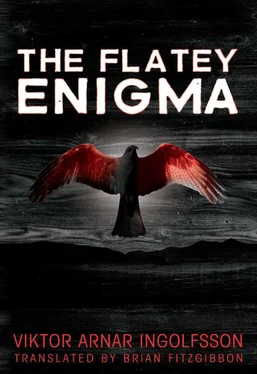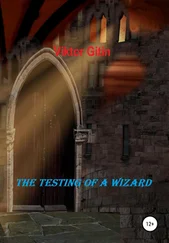Viktor Ingolfsson - The Flatey Enigma
Здесь есть возможность читать онлайн «Viktor Ingolfsson - The Flatey Enigma» весь текст электронной книги совершенно бесплатно (целиком полную версию без сокращений). В некоторых случаях можно слушать аудио, скачать через торрент в формате fb2 и присутствует краткое содержание. Жанр: Триллер, на английском языке. Описание произведения, (предисловие) а так же отзывы посетителей доступны на портале библиотеки ЛибКат.
- Название:The Flatey Enigma
- Автор:
- Жанр:
- Год:неизвестен
- ISBN:нет данных
- Рейтинг книги:5 / 5. Голосов: 1
-
Избранное:Добавить в избранное
- Отзывы:
-
Ваша оценка:
- 100
- 1
- 2
- 3
- 4
- 5
The Flatey Enigma: краткое содержание, описание и аннотация
Предлагаем к чтению аннотацию, описание, краткое содержание или предисловие (зависит от того, что написал сам автор книги «The Flatey Enigma»). Если вы не нашли необходимую информацию о книге — напишите в комментариях, мы постараемся отыскать её.
The Flatey Enigma — читать онлайн бесплатно полную книгу (весь текст) целиком
Ниже представлен текст книги, разбитый по страницам. Система сохранения места последней прочитанной страницы, позволяет с удобством читать онлайн бесплатно книгу «The Flatey Enigma», без необходимости каждый раз заново искать на чём Вы остановились. Поставьте закладку, и сможете в любой момент перейти на страницу, на которой закончили чтение.
Интервал:
Закладка:
Kjartan hovered in the doorway and finally said, “I was in the church this morning when they announced that your father passed away. I’m very sorry.”
She was slow to answer but finally said, “Thank you. My father was actually very ill, and he’d been longing to die for some time.”
“I know, but it’s still sad to lose a father,” said Kjartan.
“Yes, that’s certainly true. It leaves a vacuum, and maybe it’s harder than I expected. I came here this evening to take a look at the books he admired the most.”
Kjartan looked around. “It’s not a big library,” he said.
“No, but it’s served its purpose for a hundred and thirty years. The building is exactly 11.2 feet wide and 15.4 feet long, I’m told.”
She was leafing through the manuscript again.
“Are you reading the Flatey Book?” he asked.
“Yes, I’m just perusing through it and jogging old memories. My father knew the original version of this manuscript more than most. The islanders take good care of their book, though, even if it’s just an imperfect copy. They normally keep it under this glass, but I’ve been given permission to browse through it.”
Kjartan drew closer and looked at the book. “Can you read that text?” he asked.
“Yes, most of it.”
“Where did you learn that?”
“My father taught me, indirectly.”
“How do you mean, indirectly?”
“It might strike some people as odd, but it seemed perfectly logical to me at the time. My mother died when I was six, and after that I was brought up by my father on his travels. We lived in Copenhagen when Dad was working on his research at the Arnamagn?an Institute and the Royal Library. He’d just completed his doctorate when my mother was diagnosed with the cancer that killed her within two years. My father and I were very close and couldn’t be parted from each other after that. Dad was withdrawn and didn’t mix much with other people unless he had to for his work. So we had few friends. I learned very early on that if I could sit quietly and behave, I could follow my father just about anywhere. He, therefore, never tried to find me a foster home. I didn’t even go to school until we moved back to Iceland after the war. Dad taught me everything I needed to learn and a lot more besides. It mightn’t have been on the national syllabus, but he often allowed me to decide what we read myself.”
She smiled at the memory. “I also believe that children should be allowed to choose what they study. The subjects should be introduced to them, and then they should decide. I realize that that would mean that everyone would have to have a private tutor, of course, which wouldn’t be very economical.”
Johanna smiled again and then continued: “My father traveled around the Nordic countries and Germany, delivering lectures about the Icelandic sagas at universities. I tagged along and sat in the corners of the lecture halls. I often read something I brought along with me or drew pictures or allowed myself to daydream about having friends and playmates. Naturally I longed for friends, but I never dared to tell my father that. I was too scared he would send me to boarding school so that I could mix with other girls. He sometimes mentioned that it might be a good idea, but I categorically refused. He was all I had after Mom died, and I didn’t dare to let go. I preferred to be with him on his trips and put up with sitting still in stuffy classrooms for hours on end.”
Johanna mused in silence a moment and then continued: “Sometimes I listened to Dad when he was delivering his lectures. I also accompanied him when he was conducting his research at the library. That was on the same conditions. I was never to disturb him while he was working. The manuscript texts could be difficult to read, and he was used to reading them out loud and skimming the words with his finger. I often stood by his side, listening and following. That’s how I learned how to read the Gothic letters and understand the spelling and abbreviations.”
Johanna stopped talking. Kjartan’s question had been answered.
“That must have been an odd life,” he said.
“Yes, but they were also very special times. I was only ten when the war broke out, and after that people just became preoccupied with themselves. No one gave much thought to a little foreign toddler of a girl following her dad around everywhere.”
“Where were you during the war years?”
“We carried on living in Copenhagen, and Dad continued on his research. After the Germans occupied Denmark, he continued his lecture tours to Germany. He was totally apolitical and completely indifferent to who happened to be in power, so long as he could pursue his studies. Researching the sagas and deciphering their mysteries was his only goal in life. There was a great deal of interest in Germanic philology in Germany at the time.”
“Why did you move back here to Iceland?”
“We were forced to. My father hadn’t realized that during the German occupation his Danish colleagues resented him traveling around Germany on lecture tours. He had such a poor grasp of what was actually going on around him that he didn’t realize that people’s attitude toward him was changing. He didn’t feel the need for friends. So long as he could find a group of university students who were willing to listen to him for part of the day, he was happy. It didn’t matter to him whether he spoke Icelandic, Danish, Swedish, Norwegian, or German. And I tagged along and listened, too. But then the Germans lost the war, and the day they pulled out of Copenhagen my father’s world crumbled. He was fired from the Arnamagn?an Institute and was never allowed to set foot on the premises again. The Royal Library was closed to him, too. His greatest treasure, the Flatey Book, had been taken away from him forever. He was driven back to Iceland and could count himself lucky that he got a teaching post in a secondary school.”
“Did he need to have access to the original manuscript to able to continue his research? Couldn’t he have used a copy like this?” Kjartan asked, pointing at the book lying on the table in front of Johanna.
“That’s a good question. Is this old vellum manuscript of any value? Everything it can say to us in the text has long been copied down, letter by letter, and even photographed, as you can see. The only thing that remains is the object itself, the vessel used to convey texts that have long reached their destinations. Why then are some people so obsessed with this ancient vellum manuscript?”
She peered into Kjartan’s eyes, but he seemed unable to offer an answer. She provided one herself: “It’s because when we look at this book and pick it up, it brings us into direct contact with people who lived in the fourteenth century. We sense their presence in the manuscript’s aura. And that was the presence that my father needed to feel. I think there are very few people who can sense that contact. To other people, this is just manuscript number 1005 folio in the Royal Library.”
“Have you seen this vellum manuscript?” Kjartan asked.
“Yes, I have. I read practically every single page over my father’s shoulder.”
“Did you sense this presence?”
“Not in the way my father could, but it’s the most beautiful book I’ve ever set my eyes on. The glowing black letters on the light brown vellum are like endless strings of pearls. To me these illuminations are on a par with the most beautiful frescoes on the ceilings of majestic palaces. Unfortunately, these photographs are just a pale reflection of what they’re really like.”
Johanna turned the pages in front of her. “When I look at these pages, I get the same feeling I get when I look at photographs of relatives and friends. It gives me some pleasure, but I’d rather meet them in person. Each page in the book is like an old friend you long to see again.”
Читать дальшеИнтервал:
Закладка:
Похожие книги на «The Flatey Enigma»
Представляем Вашему вниманию похожие книги на «The Flatey Enigma» списком для выбора. Мы отобрали схожую по названию и смыслу литературу в надежде предоставить читателям больше вариантов отыскать новые, интересные, ещё непрочитанные произведения.
Обсуждение, отзывы о книге «The Flatey Enigma» и просто собственные мнения читателей. Оставьте ваши комментарии, напишите, что Вы думаете о произведении, его смысле или главных героях. Укажите что конкретно понравилось, а что нет, и почему Вы так считаете.











